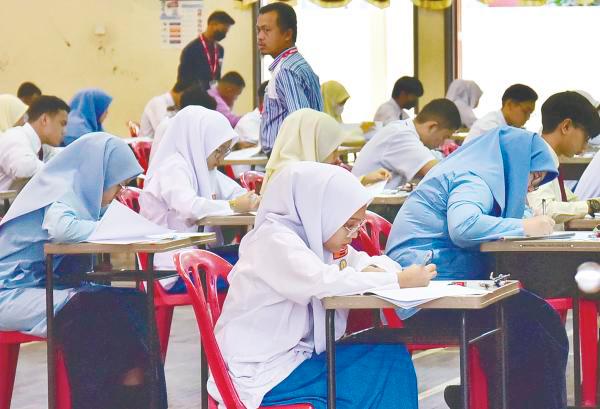PETALING JAYA: With the Education Ministry saying on Monday that 10,000 Form Five students failed to take the Sijil Pelajaran Malaysia (SPM) 2023 examinations, the Parent Action Group for Education has urged state governments to step up efforts to aid their families.
Its president Datin Noor Azima Abdul Rahim said: “State governments should provide more robust job programmes for parents and financial assistance for low-income families to ensure their children can focus on their studies.”
She said it is sad that of the 395,870 candidates who sat for the national examination last year, 10,000 missed it for various reasons, mainly due to coming from disadvantaged backgrounds with financial issues.
Noor Azima said this was the case despite the significant decrease in the number of students not taking the SPM examinations, which showed an improvement compared with 2022 when 30,000 students missed it.
ALSO READ: SPM 2023: No tuition, up at 4 am, all-rounder Orang Asli girl scores 9As
She said using technology may not be the answer for all students to achieve the national education goal.
Instead, a more human and personalised approach through parental involvement and state government intervention is needed.
“For instance, since its inception in 2009, Selangor’s People’s Tuition Programme (SPTP) has extended a helping hand to struggling SPM candidates in the state, with approximately 65,000 students set to benefit from free tuition in six subjects.”
Launched as a RM6 million state initiative, SPTP provides coaching in Bahasa Melayu, English, History, Science and Mathematics, and from this year, Additional Mathematics as well.
The programme has enlisted the expertise of 1,956 teachers to support students in their academic endeavours.
The initiative involves more than 270 schools across Selangor, demonstrating the state’s commitment to enhancing educational opportunities for its youths.
However, Noor Azima pointed out that despite such initiatives, Selangor still had the highest number of dropouts.
She stressed the need for the state government to continue implementing such programmes and maintaining public engagement to effectively address the dropout issue.
“The severe impact of mental health and economic challenges on families also often forces students to prioritise work over education.
“Students who lack basic reading, writing and arithmetic skills often face mental health issues. This further hampers their academic performance.
“Mental health support should come from the community and state, with experts and counsellors visiting schools periodically to help alleviate the problem.”
Noor Azima also called for policy changes, adding that while it is ideal to make secondary school education compulsory, support from the students’ homes needs to be secure first.
“Some students may feel they will fail the SPM as they could not prepare well for it due to the various disadvantages they faced and therefore did not see any point in taking the examinations.
“Hence, initiatives to enhance parental engagement through educational workshops and stronger Parent-Teacher Associations should be encouraged.”
She said enhancing engagement through regular communication between parents and teachers and having parent education programmes can significantly improve and support the academic journey of students.
She also said economic interventions such as scholarships, financial aid and subsidised transport could further reduce the financial burden on students.
She added that improving the school environment with better facilities and teacher support could create a more conducive learning setting to foster student success.
Additionally, public awareness campaigns highlighting the importance of completing the SPM examinations and sharing the success stories of students could motivate others to stay the course.
“Collaborative efforts between schools, government bodies and non-governmental organisations to ensure higher participation rates in the SPM exams are crucial. While the reduction in absenteeism is a positive step, more comprehensive efforts are required.
“By implementing targeted interventions and support systems, the dropout rate for SPM exams can be further reduced, offering better future opportunities for students.”









